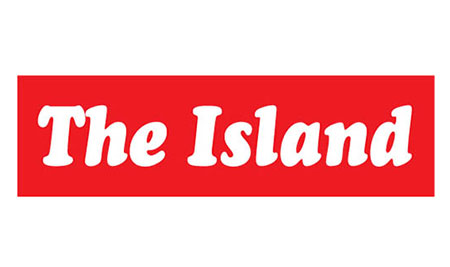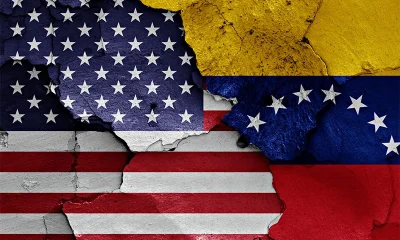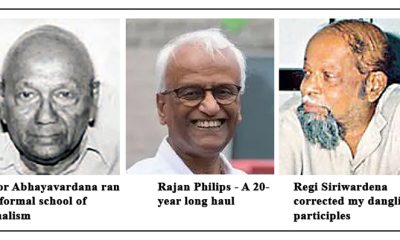Editorial
Hi, aliens!

Saturday 12th December, 2020
We thought the only thing outlandish about the outgoing US President Donald Trump was his tonsorial choice, but now a top Israeli scientist, who is widely considered the father of the Jewish State’s space capabilities, tells us that Trump has had extraterrestrial connections, all these years.
A startling claim mady by Israel’s ex-space security chief, Prof. Haim Eshed, who served in that position for three decades, has taken the world by storm; he has been quoted by a vernacular Israeli newspaper as saying the US and Israel have been associating with aliens for a long time, and a ‘galactic federation’, of which the US is a member, has prevented Trump from blabbing. The story has been picked up by wire services and disseminated across the globe.
Cynics may ask whether it was on aliens’ advice that Trump suggested, much to the horror of medical professionals on earth, that injecting disinfectants might help treat COVID-19, and whether aliens had a hand in his superfast recovery from the disease. They may also wonder how on earth Trump got beaten at the recent presidential election despite being in the exalted company of his super intelligent alien allies, for whom manipulating an election in his favour should be child’s play. He was accused of securing the coveted presidency with the help of the Russians in 2016. Is it that aliens are not as skillful as Russians, or are they more democratic than Trump and, therefore, let the Americans determine the outcome of the recent election?
Prof. Eshed’s claim reminds us of the storyline of Dan Brown’s unputdownable novel, Deception Point. Among those who think Prof. Eshed has gone a bit too far is the Chairman of the Israel Space Agency, Isaac Ben-Israel. NASA has said, in a media statement, presumably in response to inquiries being made about Prof. Eshed’s claim, that one of its key goals is to find life in the wider universe, but it has yet to find signs of it.
Unbelievable, if not bizarre, as the Israeli professor’s claim may sound to the scientific community engaged in space exploration, it is very likely to go down well with the Americans as well as their counterparts elsewhere. Laymen will find it hard to dismiss Eshed’s much-publicised claim as a figment of the imagination of an ageing scientist or a publicity stunt to sell his book, The Universe Beyond the Horizon. As for Americans, there is still no consensus on who really killed JFK, and conspiracy theories about his assassination, witnessed by thousands of people, abound. Besides, an Associated Press-GfK poll revealed, in 2011, that about 77 percent of adult Americans believed that ethereal beings called angles were real. About 34 percent of Americans surveyed in an AP-Ipsos poll, in 2007 said they believed in ghosts and UFOs. In September 2019, many UFO enthusiasts went on pilgrimage, as it were, to Area 51, which has become famous owing to rumours about UFO sightings and alien life. We, in this country, have our share of believers in supernatural forces; many are the claims that heavenly beings emitting streaks of bright light have been sighted above some places of worship. So, Prof. Eshed’s claim may be received well here as well.
What would Prof. Stephen Hawking have said if Eshed had made the claim at issue a few years ago, when the former was alive? Hawking believed that there could be life in other parts of the universe, and asked humans to be wary of trying to contact extraterrestrial being as reaching out to them could endanger this planet; he famously likened a possible encounter between humans and aliens to the historical one between Native Americans and Christopher Columbus, which he said, ‘did not turn out so well’.
Those of us living in this part of the world have more than our fair share of problems to contend with and, therefore, may not give a tinker’s cuss about aliens or ‘galactic federations’. We can only hope that threats, both real and perceived, to this planet from aliens, asteroids, solar storms, etc., will make the powerful nations fighting for global dominance and stockpiling nukes for that purpose realise that humans, regardless of their geographic dispersion and man-made distinctions, have a shared future. Coronavirus has already exposed the helplessness of humankind as never before, but, perhaps, only the arrival of some evil aliens, viewing earthlings as a future food sources, may bring humans together.
Editorial
When docs down stethoscopes

Saturday 24th Junuary, 2026
Doctors launched a 48-hour token strike yesterday in protest against what they have described as the government’s failure to implement a six-point agreement reached between the Government Medical Officers’ Association (GMOA) and the Ministry of Health. They are demanding that their allowances be increased and a separate service minute be introduced for the state sector doctors, among other things. The government has claimed that the doctors’ demands are unreasonable, and the strike did not cripple the state health institutions. It is sounding just like its predecessors.
The government is either misinformed or believing in its own propaganda lies. Doctors’ strikes always have a crippling impact on the state-run hospitals and cause unbearable suffering to patients who are dependent on free healthcare. The government should stop making false claims, and face reality.
Ideally, doctors should not strike at the expense of the sick, but there arise situations where they are compelled to flex their trade unions muscles to jolt governments into heeding their grievances. The incumbent government led by the JVP, which used strikes as part of its strategy to capture state power, has failed to be different from the previous administrations which mismanaged labour issues and provoked workers into trade union action, causing much inconvenience to the public. State workers and their trade unions backed the JVP-led NPP to the hilt, enabling its meteoric rise to power, and after winning the 2024 general election, the NPP declared that there would be no need for strikes thereafter because the new government would resolve all trade union disputes amicably without leaving any room for work stoppages. That pledge has gone unfulfilled.
Opinion may be divided on the striking doctors’ demands, but if the government has agreed to grant them, it must fulfil its pledge or have another round of negotiations and arrive at a compromise formula. It will be a mistake for the government to play a game of chicken with the GMOA or try to intimidate doctors with the help of its propaganda hitmen and front activists who stage protests against strikers, posing as patients and concerned citizens and calling for action to crush trade union struggles. Such tactics are counterproductive.
The warring doctors must also be flexible. Although the government, in its wisdom, has boasted that the state coffers are overflowing and it is free from pecuniary woes due to its proper economic management and its successful battle against corruption, the economic situation is not that rosy. Recent natural disasters have taken a heavy toll on the economy, and rebuilding and relief programmes will cost a great deal of state funds. So, the GMOA should factor in this harsh reality and act accordingly for the sake of the ordinary people who cannot afford to pay for healthcare. It is the interests of the public that must prevail.
The GMOA has threatened to stage a continuous strike unless the government grants its demands without delay. If the history of health sector strikes is anything to go by, the doctors are very likely to carry out their threat. The government should stop letting the grass grow under its feet and bring the GMOA to the negotiating table, and have a serious discussion. An assurance from President Anura Kumara Dissanayake himself that the government’s promises to the doctors will not go unfulfilled may help defuse tension and prevent a crippling health sector strike. A confrontational approach is bound to aggravate the situation.
Editorial
A tale of two AGs and dirty politics

Friday 23rd January, 2026
The JVP-led NPP government has delayed the appointment of one AG—Auditor General—and is in overdrive to oust the other AG—Attorney General. Determined to parachute a ruling party crony into the post of Auditor General, allegedly in a bid to cover up corrupt deals on its watch, the government is believed to be biding its time until the reconstitution of the Constitutional Council to achieve its goal. The JVP/NPP is unashamedly using its propaganda brigade to carry out malicious social media attacks on Attorney General Parinda Ranasinghe Jr., PC, and having public protests held against him in a bid to hound him out of office.
It is said that a bad workman blames his tools. Similarly, an incompetent government quarrels with vital state institutions and public officials when it finds itself in trouble or fails to deliver. Inefficient, arrogant politicians also launch witch-hunts against key state officials who have the courage to stand up to political pressure, fiercely defend their independence and carry out their duties and functions without fear or favour. This, we have witnessed during successive governments. It is no surprise that the JVP-led forces are all out to oust AG Ranasinghe.
Not that the Attorney General’s Department has been truly independent and blameless; it has its fair share of servile officials who pander to the whims and fancies of ruling party politicians. This newspaper has been critical of the manner in which the AG’s Department handled some cases and helped open escape routes for politicians in power and their cronies. There is a huge backlog of cases due to inordinate delays on the part of the AG’s Department. These institutional deficiencies have been there for decades, and the incumbent AG alone cannot be blamed for them. There is a pressing need to straighten up the AG’s Department, which is in need of restructuring. Devolution is among the proposed solutions.
Government supporters have been holding protests, making unsubstantiated allegations against AG Ranasinghe and calling for his ouster. The tendency to hold kangaroo trials is in the JVP’s DNA. The JVP acted as the prosecutor, judge, jury and executioner in the late 1980s; it gunned down quite a few professionals including University Vice Chancellors and the heads of some other state institutions during its reign of terror. Now, it has apparently shifted from assassinations to character assassination, which can be a fate worse than death for most people. It used death-dealing sparrow units to eliminate its targets in the past. Today, it deploys its propaganda brigade to destroy its opponents politically.
If anyone believes that the AG is at fault, he or she can invoke the jurisdiction of either the Appeal Court or the Supreme Court to seek redress. If the government has irrefutable evidence to prove its supporters’ allegations against AG Ranasinghe, then Parliament can remove him after a probe. Dirty social media attacks and protests are certainly not the way.
In 2012-13, the JVP rightly defended the then Chief Justice Dr. Shirani Bandaranayake, when the Mahinda Rajapaksa government targeted her for political reasons and launched a vilification campaign against her before wrongfully impeaching her. Now, the JVP-led NPP government stands accused of trying to get rid of the state prosecutor.
The ongoing propaganda campaign against the AG could also be part of a strategy to paint a black picture of the AG’s Department, turn public opinion against it and prepare the ground for setting up the proposed Independent Prosecutor’s Office.
When the present-day government leaders promised ‘a system change’ during their election campaigns in 2024, it was thought that they were planning to change the systems for the better, but now one wonders whether they are bent on changing the existing systems for the worse by politicising them more.
The Bar Association of Sri Lanka deserves praise for having taken up the cudgels for beleaguered AG Ranasinghe. Let all right-thinking Sri Lankans, particularly the state sector professionals, be urged to follow suit.
Editorial
Conspiracy to subvert constitutional order

Thursday 22nd January, 2026
Former South Korean Prime Minister Han Duck-soo was yesterday sentenced to 23 years in prison for aiding and abetting the insurrection of the impeached former President Yoon Suk-yeol in 2024. The court confirmed that Yoon’s declaration of emergency martial law on 03 Dec., 2024 constituted an insurrection aimed at subverting the constitutional order. It pointed out that Han had helped provide a procedural facade of legitimacy for the illegal martial law by holding an unlawful Cabinet meeting.
That is how South Korea has dealt with those responsible for ‘an insurrection aimed at subverting the constitutional order”. But in Sri Lanka, no investigation has been launched into an illegal bid to appoint an interim President in violation of the Constitution and plunge the country into anarchy in 2022.
Irrefutable evidence has emerged that at the height of Aragalaya, on 13 July 2022, a foreign diplomat and a group of Sri Lankans consisting of religious leaders made a blatantly illegal bid to pressure the then Speaker Mahinda Yapa Abeywardena to take over the executive presidency in violation of the Constitution. Abeywardena himself said so in Parliament in early 2024. Following the defeat of a motion of no confidence against him, Abeywardena disclosed that after President Gotabaya Rajapaksa’s resignation in July 2022, he had come under immense external and internal pressure to take over as president. When he refused to comply, they had resorted to intimidatory tactics, he said, claiming that their intention was to create in Sri Lanka a situation similar to that in Libya. In other words, they sought to commit a serious crime against the State of Sri Lanka.
Professor Sunanda Maddumabandara, who was Senior Advisor (Media) to President Ranil Wickremesinghe, has disclosed in his book, ‘Aragalaye Balaya’ (‘Power of Aragalaya’), that on 13 July 2022, the then Indian High Commissioner to Sri Lanka Gopal Baglay visited Abeywardena and asked him to take over as president, but the latter said in no uncertain terms that he would never violate the Constitution. Abeywardena has revealed that soon after Baglay’s departure, a group of Sri Lankans led by Ven. Omalpe Sobitha, arrived at the Speaker’s official residence and asked him to take over the presidency. When he repeated what he had told the Indian envoy, Sobitha Thera sought to intimidate him into doing their bidding. The group consisted of another Buddhist monk, some Catholic priests, and a trade unionist, according to Abeywardena.
Prof. Maddumabandara has said Baglay told Abeywardena that if he took over the presidency, protests could be brought under control within 45 minutes. In a brief interview with our Associate Editor Shamindra Ferdinando, who reviewed Aragalaye Balaya, Prof. Maddumabandara has said only a person who had control over the protesters could give such an assurance. One may recall that it was the JVP that led the protesters who surrounded Parliament and tried to march on it in July 2022. Minister K. D. Lal Kantha himself has admitted that the JVP tried to lead the Aragalaya protesters to capture Parliament, but without success.
Interestingly, in early 2024, the Indian government, in what was described as a significant diplomatic outreach, invited JVP leader Anura Kumara Dissanayake to India, enabling the JVP to gain much-needed international legitimacy, which gave a fillip to Dissanayake’s presidential election campaign. By that time, the JVP had abandoned its rapid anti-Indian posturing, which underpinned its reign of terror in the late 1980s. Today, India has the JVP/NPP eating out of its hand, and the JVP-led government refuses to disclose the contents of several pacts, including one on defence, it has signed with India!
Prof. Maddumabandara has revealed that a contingent of the STF was deployed on the compound of the Speaker’s official residence unbeknownst to Abeywardena amidst attempts by violent mobs to capture Parliament. Who ordered the STF deployment?
The use of force, threat, conspiracy, or organised action to achieve unconstitutional change is a crime. But the 13 July 2022 conspiracy has gone uninvestigated. The JVP-NPP government will not have it probed for obvious reasons; it does not want to open a can of worms and antagonise India. But the need for a high-level investigation into the 13 July 2022 conspiracy to overthrow constitutional order cannot be overstated. Will the Opposition politicians who wrap themselves in the flag take up this issue?
-

 Editorial6 days ago
Editorial6 days agoIllusory rule of law
-

 Features6 days ago
Features6 days agoDaydreams on a winter’s day
-

 Features6 days ago
Features6 days agoSurprise move of both the Minister and myself from Agriculture to Education
-

 Features5 days ago
Features5 days agoExtended mind thesis:A Buddhist perspective
-

 Features6 days ago
Features6 days agoThe Story of Furniture in Sri Lanka
-

 Opinion4 days ago
Opinion4 days agoAmerican rulers’ hatred for Venezuela and its leaders
-

 Features6 days ago
Features6 days agoWriting a Sunday Column for the Island in the Sun
-

 Business2 days ago
Business2 days agoCORALL Conservation Trust Fund – a historic first for SL













